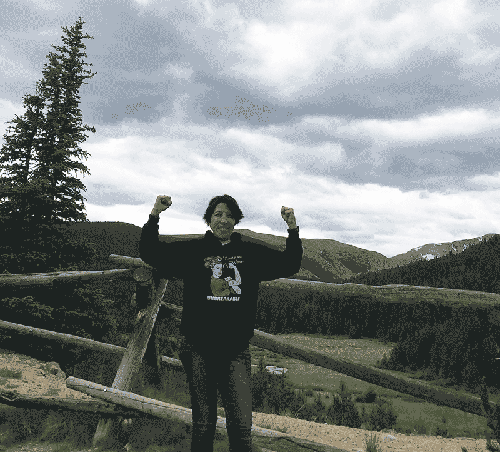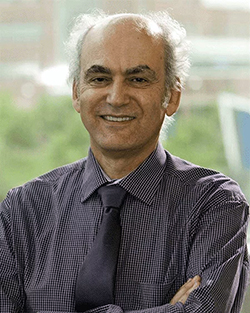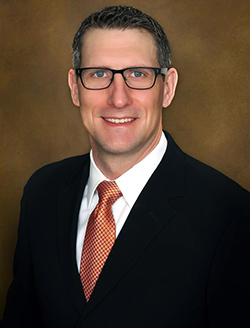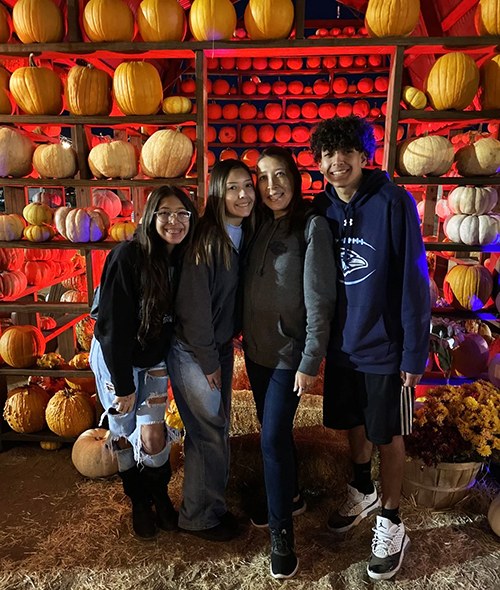COMPREHENSIVE CARE
Karla Ojeda’s medical journey through cancer care and transplant surgeries
By Tyler Smith
October 2023
Astrophysicist Neil deGrasse Tyson once said, “The universe is under no obligation to make sense to you.” While he aimed the comment at those resistant to seeking answers in science, his message applies equally well to those whose lives are struck by seemingly random cruelty.
It is in that latter way that his words echo for Karla Ojeda.
Ojeda is a 45-year-old wife, mother of three teenagers she calls her “driving force,” and the proud daughter of strong immigrant parents. Her longtime job as Human Services Community Resources coordinator with Adams County satisfies her passion for helping people.
Yet life has also mysteriously battered the strong moorings of Ojeda’s life. A genetic mutation saddled her with polycystic kidney disease (PKD), an incurable condition that brought her kidneys to the brink of failure.

Karla Ojeda
Cysts also ravaged her liver, and Ojeda urgently required a transplant. While waiting for a donor liver, Ojeda was diagnosed with breast cancer. The assault left her wondering why such misfortune had been heaped upon her.
“I’ve always believed that things happen for a reason,” Ojeda says. “Sometimes you know why and sometimes you don’t. Going through my medical journey, a lot of times, I didn’t understand why things would happen, and I would get frustrated.”
Ojeda is still waiting for those answers. But through her own will and determination and skilled medical care at UCHealth University of Colorado Hospital (UCH), she has fought through the array of challenges and looks forward to a life free from the shackles of disease.
LIVING WITH KIDNEY DISEASE
The major thread of Ojeda’s health ordeal is PKD, a genetic condition that riddles the kidneys with fluid-filled cysts. Over time, the cysts grow and take over space from healthy tissue, greatly increasing the risk of kidney failure. Ojeda learned she had PKD during high school after a long, unexplained illness. At that point, she wasn’t fazed by the diagnosis.
“I thought I was invincible,” Ojeda said.
She learned to control her blood pressure, limit her salt intake, drink plenty of water, and exercise. She was particularly cautious during her three pregnancies. Her kidney function continued to worsen, but in 2018 she got some help from tolvaptan, the first FDA-approved drug to treat PKD. The drug blocks the hormone vasopressin, which prevents an individual from urinating constantly, explained Charles Edelstein, MD, PhD, a kidney disease specialist who treats Ojeda in the UCHealth Polycystic Kidney Disease Clinic – Anschutz Medical Campus.
“Vasopressin causes the cells lining the cysts in the kidneys to proliferate and the cysts to grow,” said Edelstein, who is a professor of medicine at CU School of Medicine. By blocking vasopressin, tolvaptan forces an individual to urinate frequently, thus slowing – but not stopping – cyst growth, he added.
UNUSUAL LIVER PROBLEM
A more immediate problem for Ojeda, Edelstein added, was her polycystic liver disease (PLD), which frequently accompanies PKD.
“Most patients have both [PKD and PLD],” Edelstein said. “Normally, the kidneys get big and cystic and fail, and the liver doesn’t present a problem. For Karla, the case was the other way around. She needed a liver transplant before a kidney transplant, which is extremely unusual.”
The cysts in Ojeda’s liver ballooned from a normal size of 2 pounds to 11. The organ wasn’t failing, Edelstein said, but taking up so much space in the abdomen that other organs, like the intestines, couldn’t function normally.
“I was very fatigued. Eating was hard,” said Ojeda. “I could feel the pressure in my abdomen, much like when I was pregnant.”
BREAST CANCER DIAGNOSIS
Ojeda was on the list for a liver transplant when she absorbed another unexpected blow. During a routine pre-transplant exam in May 2018, she received a mammogram that revealed she had breast cancer. The shocking diagnosis was magnified by the necessity to put the liver transplant on hold. It was a setback, but Ojeda said the breast cancer and transplant teams at UCH worked together to restore her health and keep the search for an organ donor on track.

Charles Edelstein, MD, PhD, is professor of medicine at CU School of Medicine and the kidney specialist who treats Karla Ojeda in the UCHealth Polycystic Kidney Disease Clinic–Anschutz Medical Campus.
After a lumpectomy to remove the cancerous tumor, Ojeda underwent eight rounds of weekly radiation treatments. Five years later, she is cancer-free.
“I never felt hopeless at all,” she said. She acknowledges, however, the period of treatment and waiting for a liver took both a physical and emotional toll.
“There was a lot I had to give up,” Ojeda said. “I couldn’t always go to my kids’ activities or be in public because of my fatigue and side effects from the radiation.”
She considered taking time off from work but decided against it.
“I felt that work was the only thing that remained normal,” she said, crediting her employer for giving her accommodations through the difficult time.
“The kidney works beautifully,” Ojeda said. She estimated that she is back to 90% of how she was before the “emotional rollercoaster” of health problems.
Her success story has many supports. The Polycystic Kidney Disease Clinic, staffed by Edelstein, fellow kidney disease specialist Michel Chonchol, MD, professor of medicine, and nurse Amy Wilbur, is a PKD Foundation Center of Excellence based on its expertise, integrated care, research, and network of providers.

Thomas Pshak, MD
A direct benefit of that status for Karla Ojeda and other PKD patients: the PKD Clinic is housed on the same floor as the Transplant Clinic, and the providers in each work closely together.
Edelstein and Pshak manage Ojeda’s kidney care, while Pomposelli and liver transplant specialist James Burton, MD, professor of medicine, coordinate her liver care. Edelstein also noted that the University of Colorado School of Medicine has a long history of expertise and leadership in PKD clinical care and research. It began with Patricia Gabow, MD, professor emerita of medicine, in the 1970s and continued with the late Robert Schrier, MD, who brought the school’s Division of Renal Diseases and Hypertension to national prominence during two decades of leadership.
“It’s led to many patients coming to our clinic from out of state,” Edelstein. The reach stretches across the Rocky Mountain region and as far away as Alaska, he added.
WELL-ROUNDED CARE

Karla Ojeda (second from right) had a kidney transplant that gave her a new lease on life. She is photographed with her children, Jordyn, Jade, and Carlos Jr. Photo courtesy of Karla Ojeda.
Ojeda said she appreciated the “well-rounded care” that UCHealth offered. For example, she faced mental health challenges after the transplants, partly because of a loss of self esteem she attributes to weight gain caused by the prednisone she takes as a post-transplant immunosuppressant. She also suffered feelings of guilt for putting her family through her ordeal. Ojeda said Melissa Kitowski, PhD, with the CU Department of Psychiatry, helped her deal constructively with these painful thoughts.
“I’m working back, and things are falling into place,” Ojeda said.
She credits her husband for helping her to maintain her strength and resolve during difficult times, but she has a fortress of support. For example, her parents, immigrants from Chile, instilled a strong ethic of personal growth and commitment, she said.
“My parents emphasized the importance of getting a good education and working hard to go far in life and be able to enjoy it,” Ojeda said. She added that her dad prodded her to stay positive as she battled through her cancer treatments and transplant surgeries.
An extended group of people, including her sisters-in-law, whom she calls “my pillars,” also assisted Ojeda through hard times, helping her husband, watching the kids, and keeping her company.
Most of all, the three kids, Jade, Carlos, and Jordyn, pushed her to battle back.
“I kept telling myself that I have to keep going,” she said. “I want to see them grow up, graduate from high school, and do whatever they want to do with their lives. I always kept that in the back of my head.”
The long periods of missing their activities are behind Ojeda. She experienced the “indescribable joy” of watching daughter Jade’s high school graduation on May 22 and has enjoyed watching all the kids play basketball, soccer, and volleyball and participate in choir.
The universe hasn’t explained itself to Ojeda. She doesn’t claim to understand why she has borne the toll of disease. But she has learned from her experience.
“I concluded that people can go through really hard things and have a beautiful, positive ending,” Ojeda said.
“When you are struggling and going through it, it’s hard to see the light at the end of the tunnel. But as long as you believe in yourself and have a good support system and people who love you, you can make it through just about anything in life. A lot of times, I thought, ‘I can’t do this.’ I learned that I could."
This article was originally published by UCHealth in June 2023.